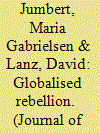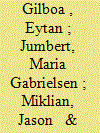| Srl | Item |
| 1 |
ID:
120919


|
|
|
|
|
| Publication |
2013.
|
| Summary/Abstract |
This article is concerned with the rebellion in Darfur as a way to illustrate the politics of insurgency in the era of globalisation. We first show how the Darfur rebels have projected their struggle onto the world stage, before examining the effects that this has engendered. On the one hand, Darfur's global profile solidified the rebels' cause and co-opted international actors in support of it. This translated into real leverage for the rebels, and it constrained the Sudanese government by reducing its ability to use brute force. At the same time, internationalisation encouraged the Darfur rebels to make maximalist demands at the expense of articulating a broader political vision addressing the root causes of conflict. Moreover, the substitution of local legitimacy for international connections lowered the barriers of entry for new groups and thus promoted fragmentation. The combination of these effects makes for intractable conflict scenarios, the current situation in Darfur being a case in point.
|
|
|
|
|
|
|
|
|
|
|
|
|
|
|
|
| 2 |
ID:
148127


|
|
|
|
|
| Summary/Abstract |
After the ‘CNN effect’ concept was coined two decades ago, it quickly became a popular shorthand to understand media-conflict interactions. Although the connection has probably always been more complex than what was captured in the concept, research needs to be updated in order to better understand the multifaceted contemporary environments of both media and conflict. There are growing numbers and types of media sources, and multiple interactions between media and conflict actors, policymakers and engaged publics from the local to the global and back. We argue that understanding the impact of media reporting on conflict requires a new framework that captures the multilevel and hybrid media environments of contemporary conflicts. This study provides a roadmap of how to systematically unpack this environment. It describes and explains how different levels, interactions, and forms of news reporting shape conflicts and peacebuilding in local, national and regional contexts, and how international responses interact with multiple media narratives. With these tools, comprehensive understandings of contemporary local to global media interactions can be incorporated into new research on media and conflict.
|
|
|
|
|
|
|
|
|
|
|
|
|
|
|
|